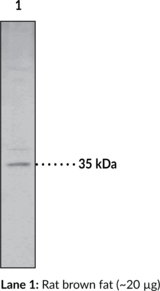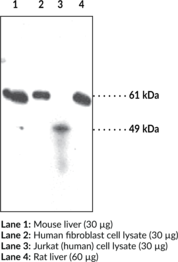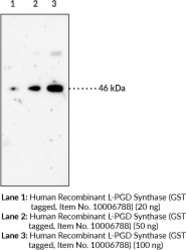Description
Endocannabinoids, such as arachidonoyl ethanolamide (AEA) and 2-Arachidonoyl glycerol (2-AG), function as short-range modulators of cell and synaptic activity. Monoacylglycerol lipase (MAGL) hydrolyzes 2-AG to terminate its biological actions and works consecutively with hormone-sensitive lipase (HSL) to mobilize fatty acids from the triglyceride stores of adipocytes.{11364,11436} MAGL has a molecular weight of ~33 kDa and exhibits a high degree of homology among human, mouse, and rat at the amino acid level.{11364,11436,5105,10671} The enzyme is expressed in a variety of tissues with most abundant expression in skeletal muscle and adipose tissue, suggesting a role of MAGL in monoglyceride hydrolysis in diverse tissues. Cayman Chemical’s MAGL polyclonal antibody can be used for western blot and immunohistochemical (formalin-fixed paraffin-embedded tissue) analysis for MAGL on samples of human, mouse, rat, and bovine origin. Other applications for use of this antibody have not yet been tested.
Synonyms: HU-K5|Lysophospholipase homolog|MAGL|MGL|MGLL
Immunogen: Synthetic peptide from human MAGL
Formulation: 500 μl of peptide affinity-purified IgG
Isotype:
Applications: IHC (formalin-fixed paraffin-embedded tissue) and WB
Origin: Animal/Rabbit
Stability: 365 days
Application|Immunohistochemistry||Application|Western Blot||Product Type|Antibodies|Polyclonal Antibodies||Research Area|Lipid Biochemistry|Endocannabinoid/Endocannabinoid-like||Research Area|Lipid Biochemistry|Glycerolipids|Lipases||Research Area|Neuroscience|Cannabinoid Research




